
The similarities between Rooms — a simple, charming game for iOS and the web where you design rooms — and Minecraft are easy to spot. Both share a blocky visual style and a design-your-own-retreat objective. But describing Rooms as a scaled-down Minecraft for people over the age of 12 doesn’t give it enough credit. It’s good, old-fashioned building in the vein of Lego, The Sims, and Animal Crossing. Rooms builds on the time-honored tradition with a dose of coziness and creativity that’s limited only by your patience for arranging three-dimensional pixels.
Rooms is free, at least for now; creator Jason Toff says there are no “concrete monetization plans.” The premise is as simple as it sounds: you start with an empty room and fill it up with stuff. A room, in this case, is a three-dimensional space with two walls and a floor, open to the viewer like a diorama.
:format(webp)/cdn.vox-cdn.com/uploads/chorus_asset/file/25375336/7.png)
You add objects and furniture, customize the flooring and wallpaper, and either make it public to share with the world or keep it private. There’s a library of common objects you can drop into your room — like furniture, rugs, and windows — and if you want to keep things simple, you can just arrange predesigned elements to your heart’s content.
That’s Rooms at its most basic. Then there’s sicko Rooms; if you want to go deep, you can go deep. Rooms don’t have to be rooms at all — some do away with the walls entirely, and some are games, like one where you guide a ball through a maze by using direction arrows to tilt the “board.”
You can set up your room so that tapping an object triggers an event or takes you to another room, like the dentist’s office where tapping the patient takes you into a mouth with instructions to extract an unhealthy tooth. With patience and maybe a little coding knowledge, a room can be just about anything. But even if you lack those things, it’s easy to make a room without getting into all of that. I whipped up a little coffee shop without much effort on day one; by day two, I had a cozy reading room to go with it.
Making your own rooms is only part of the charm. The iOS app encourages exploring other rooms with a TikTok-like vertically scrolling FYP when you open the app. A recent 2.0 update added a honeycomb view so you can look at a bunch of rooms at once and jump into any that catch your eye.
With this social aspect, Rooms almost has an early internet vibe, like GeoCities or Myspace. The question those sites and this game ask is the same: if you could personalize your own little digital space, what would it look like?
The answers are surprisingly similar. There are tributes to fandoms and pop culture. Some people use them to tell stories. But in one way or another, most of them provide a way to present a part of yourself to the world: here’s what I’m into, or here’s the kind of place I’d like to go. It’s charming and surprisingly personal.
It’s potentially addictive, too, if you’re like me. I played Animal Crossing long after everyone else I knew left their islands to be reclaimed by weeds. Mostly, I was designing and then redesigning my house to pay tribute to certain spaces, real and fictional. I can’t explain it, but turning the top floor of my AC house into a Barnes & Noble (complete with a cafe!) was incredibly soothing to me. Maybe I’m just looking for a little retreat from the noise of modern life — and for that, Rooms is an excellent escape.



